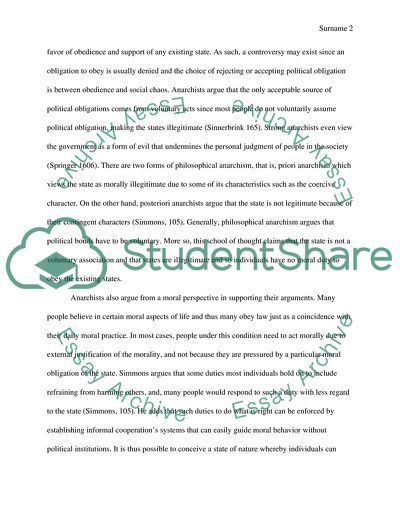Cite this document
(Assessing A. J. Simmonss Theory of Philosophical Anarchism Essay Example | Topics and Well Written Essays - 1750 words, n.d.)
Assessing A. J. Simmonss Theory of Philosophical Anarchism Essay Example | Topics and Well Written Essays - 1750 words. https://studentshare.org/philosophy/1812090-assess-aj-simmonss-theory-of-philosophical-anarchism-is-it-a-successful-analysis-of-obligation-and-legitimacy-whywhy-not-what-does-the-philosophical-anarchist-critique-tell-us-about-obligation-and-state-authority
Assessing A. J. Simmonss Theory of Philosophical Anarchism Essay Example | Topics and Well Written Essays - 1750 words. https://studentshare.org/philosophy/1812090-assess-aj-simmonss-theory-of-philosophical-anarchism-is-it-a-successful-analysis-of-obligation-and-legitimacy-whywhy-not-what-does-the-philosophical-anarchist-critique-tell-us-about-obligation-and-state-authority
(Assessing A. J. Simmonss Theory of Philosophical Anarchism Essay Example | Topics and Well Written Essays - 1750 Words)
Assessing A. J. Simmonss Theory of Philosophical Anarchism Essay Example | Topics and Well Written Essays - 1750 Words. https://studentshare.org/philosophy/1812090-assess-aj-simmonss-theory-of-philosophical-anarchism-is-it-a-successful-analysis-of-obligation-and-legitimacy-whywhy-not-what-does-the-philosophical-anarchist-critique-tell-us-about-obligation-and-state-authority.
Assessing A. J. Simmonss Theory of Philosophical Anarchism Essay Example | Topics and Well Written Essays - 1750 Words. https://studentshare.org/philosophy/1812090-assess-aj-simmonss-theory-of-philosophical-anarchism-is-it-a-successful-analysis-of-obligation-and-legitimacy-whywhy-not-what-does-the-philosophical-anarchist-critique-tell-us-about-obligation-and-state-authority.
“Assessing A. J. Simmonss Theory of Philosophical Anarchism Essay Example | Topics and Well Written Essays - 1750 Words”. https://studentshare.org/philosophy/1812090-assess-aj-simmonss-theory-of-philosophical-anarchism-is-it-a-successful-analysis-of-obligation-and-legitimacy-whywhy-not-what-does-the-philosophical-anarchist-critique-tell-us-about-obligation-and-state-authority.


